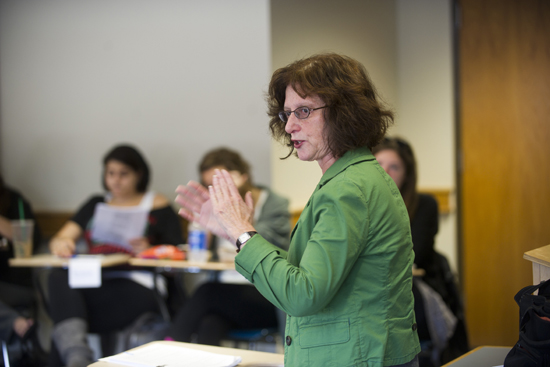One Class, One Day: Women and Comedy
Did you hear the one about the husband who wanted to talk sex?

“Hysterical” can be “hersterical” in Women and Comedy, a College of Arts & Sciences class in which Barbara Gottfried helps students dissect female humor. Photos by Cydney Scott
Class by class, lecture by lecture, question asked by question answered, an education is built. This is one of a series of visits to one class, on one day, in search of those building blocks at BU.
Movie critics be damned: while many of them swooned last spring over Bridesmaids and its comedic take on a woman’s impending nuptials, Jillian McCarty says that the “whole pooping in the sink” scene grossed her out.
“I just thought some scenes were really distasteful,” says McCarty (COM’13). Ryan Schreiner (CAS’13, COM’13) also disses the movie’s humor for targeting one niche, “the stupid guy who thought it’d be funny to see the woman crap in the wedding dress.” Brooke Murphy (SED’12), however, reports that her aunts, who are in their 60s, found the scene hilarious in an “oh my God, I almost did that one time” way.
The students are dissecting the film as part of Women and Comedy, a College of Arts & Sciences class taught by Barbara Gottfried (CAS’74), an instructor in the Women’s, Gender, and Sexuality Studies Program. She found the movie’s take on marriage so bleak that it couldn’t really be called a romantic comedy. “It comes this close to tragedy,” she says, her thumb and forefinger together.
Gottfried shares her lifelong passion for comedy with students in a course covering comediennes of stage, screen, and TV. The class focuses on pivotal figures such as Mae West and Lucille Ball and contemporary successors like Roseanne Barr, Paula Poundstone, and, yes, the cast of Bridesmaids, which includes Maya Rudolph and Kristen Wiig. Gottfried also has arranged a performance at BU by Brooklyn comedienne Erin Judge, who has appeared on the Comedy Central channel. The show, sponsored by BU’s Center for the Humanities and the African American Studies Program, will be at 5:30 p.m. on December 1 in Room 102 of Sargent College and is open to the public.

The 1980s were the key decade in feminist comedy, says Gottfried, who recalls guffawing at Whoopi Goldberg and Barr, the latter then in her salad days as a housewife trying to make it in stand-up, joking about what she knew: life with husbands. For instance, their insistence on discussing marital sexual problems (“Like I’m gonna turn off Wheel of Fortune for that. Put it on a gift certificate, babe!”). Or how they expect wives to clean the house (“Is Lemon Joy kryptonite to your species?”).
“No man could have told the same jokes,” says Gottfried. “Roseanne was famous for stories about what it meant to be a housewife with no money.”
The course, which combines viewing films and TV clips with scholarly readings, probes the ways comediennes’ humor differs from that of their male colleagues. At points, the class discussion wanders into pondering truths of the human condition. The same day they discuss Bridesmaids, students talk about postfeminist romantic comedies, in which women’s careers and financial autonomy from men are often taken for granted. So, “the question in romantic comedies is why women marry,” Gottfried observes, noting that movies such as When Harry Met Sally either hint or overtly show that married people often lose their sense of romance.
That’s not necessarily all bad, Murphy says: “How exhausting would that be, if you had to hold hands every time you walk the street?” Gottfried agrees, suggesting that film’s point is that having a career “doesn’t mean you want to spend your whole life alone.”
Gottfried is the first to admit that life and laughs don’t orbit around gender alone. For one thing, the funny bone, like the rest of our skeleton, is affected by age. “I’m very fond of Bringing Up Baby,” she says, referring to the 1938 comedy that teamed Katharine Hepburn, Cary Grant, and a leopard. “But I find that students don’t find it as hilarious as I do. They say, ‘Why is she so ditzy?’” Nor does every comedienne lean on the female experience. Ellen DeGeneres’ humor has “never been particularly gendered,” Gottfried notes. “Like Seinfeld, her humor is really about the everyday.”

Only 2 of the 20 students this semester are men, and that’s a shame, says one of them. “One of my parents is a woman. One of my siblings is a woman. If I have kids someday, some of them might be women,” Schreiner says. “If women are half or more than half of the people that are important in your life, doesn’t it mean something to understand where they are?”
Attributing the class’ lopsided gender ratio to a stigma around women’s studies that keeps men away, Megan Riesz (COM’13) says she’s been struck by how few people think women can be funny. “It’s been interesting to analyze” through the class, she says, “because I think it says something about people’s attitudes towards women.” A successful comedienne like Tina Fey, who’s also attractive, raises questions about whether it’s enough for a woman comic to be merely talented, and Riesz says she took the course to wrestle with such questions.
Gottfried, codirector of undergraduate studies for the women’s, gender, and sexuality studies program, has a doctorate in English literature. But as a teacher, she says, “I can only do so much literature because there is a whole English department.” Brainstorming new course topics back in 2009, she polled the media class she was then teaching.
“I said, ‘How many of you would take a class on the history of feminism, looking at the 1970s?’ And like three students raised their hands. I said, ‘What about women in comedy?’ And the entire class raised their hands.” When it came time to register for that fall’s 30-students-max course, she says, “it filled immediately.”
Films like Bridesmaids notwithstanding.
This Series
Also in
One Class, One Day
-
November 30, 2018
Breaking Bad Director Gives CAS Class the Inside Dope
-
October 31, 2018
Trump and the Press: We’ve Been Here Before
-
August 3, 2018
A Scholarly Take on Superheroes


Comments & Discussion
Boston University moderates comments to facilitate an informed, substantive, civil conversation. Abusive, profane, self-promotional, misleading, incoherent or off-topic comments will be rejected. Moderators are staffed during regular business hours (EST) and can only accept comments written in English. Statistics or facts must include a citation or a link to the citation.